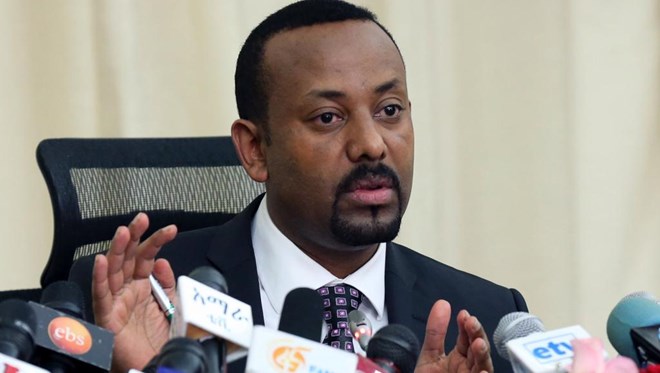
Tuesday August 28, 2018
By Christina Okello  Ethiopia’s Prime Minister, Abiy Ahmed addresses a news conference in his office in Addis Ababa, Ethiopia August 25, 2018. REUTERS/Kumera Gemechu
Ethiopia’s Prime Minister, Abiy Ahmed addresses a news conference in his office in Addis Ababa, Ethiopia August 25, 2018. REUTERS/Kumera Gemechu
Somalis in Ethiopia's eastern region have welcomed the arrest Monday of their former leader, Abdi Mohammed Omar. The former strongman is accused of stoking deadly ethnic clashes in the Somali region, Ethiopia's second largest. Somalis hope his removal will usher in a new era of accountability and a new relationship with Addis Ababa.
Ethiopia's Prime Minister Abiy Ahmed had warned on Saturday that former officials of the Somali region would be dealt with.They're accused of triggering a wave of violence that killed 29 people in Somali's provincial capital Jijiga earlier this month.
Yet, the swiftness of Abiy's approach has taken even ordinary Somalis like Juweria Ali, a PHD candidate in London, by surprise.
“He [Abdi Illey] was someone who commanded so much authority, had so much power, there was a sense of permanent about his image and his leadership," she told RFI.
Blamed for the unrest, described by Prime Minister Abiy Ahmed as "a scene from out of a movie," Abdi was forced to resign at the beginning of August after 15 years in power.
"First his resignation then his arrest took Somali people by surprise," continues Ali, "Its welcome by everybody. I think it’s a huge win for all those who have suffered under his leadership. The next question is: what about the rest?"
Somalis like Juweria Ali, don't want the arrests to stop just at Abdi. They argue that the accountability included in Prime Minister Abiy's new reformist agenda must be far reaching.
"He [Abdi] was provided with the resources to commit the very crimes he’s being charged for, so how about those who were providing him with the resources and logistics to fulfil those very crimes that he’s being charged for now?" asks the PhD candidate.
Her criticism is levelled squarely at the Ethiopian authorities, whom she says “fashioned and engineered Abdi Illey’s repressive campaign against the Somali people."
Foremost of which was the 2007 counterinsurgency campaign, primarily aimed at ousting the Ogaden National Liberation Front (ONLF).
Abdi didn't act alone
“The legacy of the 2007-8 counter-insurgency campaign is still felt today," she comments.
"I don’t think there’s a single Somali family that hasn’t been impacted by that campaign. It’s considered to be a campaign that is much wider than Abdi Illey alone."
That may be so, but critics like Rashid Abdi, Horn of Africa Project Director at International Crisis Group, warns against waging a witch hunt of senior leadership.
"I suspect that we will see senior figures implicated in human rights abuses arrested," he says. "But I think that if this goes deeper and extends to security structures then that could actually foment serious instability as well,” he told RFI.
This is a region which in the past has faced political paralysis, often referred to as a lawless land. Abdi's leadership guaranteed a certain stability, but cracks had started to form in his relationship with Abiy.
The pace of reforms being spearheaded by Ethiopia's new young minister appeared to be out of sync with Abdi's record of cruelty, repression and alleged corruption, as growing protests for change in Jijiga showed.
In a July report, US-based group Human Rights Watch (HRW) accused Abdi of running a secret jail where suspected members of a separatist group were tortured.
"It was all Somali people could talk about: Jail Ogaden, Jail Ogaden, the horrors of Jail Ogaden," says Juweria Ali.
Taming the Liyu police
Asked whether ethnic rivalry had played a part--Prime Minister Abiy is an Oromo, while Abdi is Somali--Ali replied: "Although he is the Prime Minister of a multi ethnic country, there is no doubt that wanting to see Abdi Illey held accountable for the crimes against his own people played a factor in his approach and swift arrest of Abdi Iley," she said.
"The primary motive is consolidation of power," reckons ICG's Rashid Abdi, highlighting that the former Somali regional boss was a close ally of Abiy's rival: the Tigrayan People's Liberation Front (TPLF), which had dominated Ethiopian politics, but which is now "the old order."
Still, Prime Minister Abiy will have to work hard to shore up his authority in this restless region where "tensions have always been a source of instability", says Rashid Abdi.
"Illey will probably go on trial, but we don’t know the extent of the loyalty of his Liyu police towards him," he comments.
The Liyu special police force has been blamed by rights groups of carrying out decades of abuses in the Somali region.
Abiy may have to work with the Somali region's new president Mustafa Omer to possibly revamp or dismantle the police force altogether.
Where does all this leave Ethiopia's Somali region best known as Ogaden? In search of a new identity.
"A lot will depend on the extent to which the new president will be able to rebalance relations between Addis and Jijiga," reckons Rashid Abdi.
"I think Abiy seems to have a lot of confidence in Mustafa, but I think what needs to be focused upon is not simply the personal relationship but the structural relationship," he said.